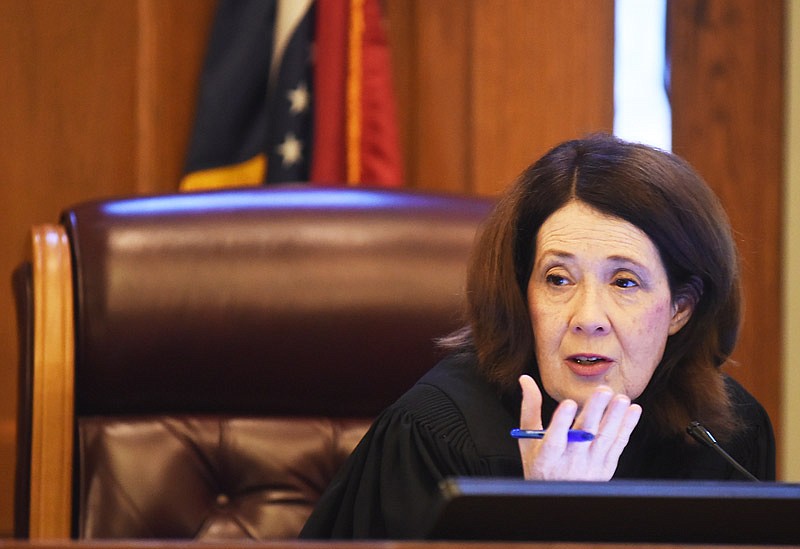At the end of a 15-minute hearing, Cole County Presiding Circuit Judge Pat Joyce denied St. Louis lawyer Elad Gross' motion to disqualify the attorney general's office from representing Gov. Mike Parson in a Sunshine Law case.
Last summer, Gross sued Parson and Michelle Hallford, the governor's custodian of records, in a seven-count lawsuit accusing them of violating provisions of the state's Sunshine law, and seeking at least $12,000 in damages.
His lawsuit complained his request for information - "as part of an investigation into Missouri nonprofit organizations using anonymous campaign contributions to circumvent Missouri campaign finance laws and influence Missouri government policy" - had not been answered as the state's law requires, and that the governor's office, once it found "13,659 documents that may be responsive" to Gross' Sunshine request, asked him to pay $3,618.40 for "90.46 hours, at $40.00/hour" of "research/processing" time.
The law says research time "required for fulfilling records requests may be charged at the actual cost of research time."
Gross' lawsuit noted previous Gov. Eric Greitens' staff had charged only $19 an hour, and that no one involved on Parson's staff with the research needed for Gross' request made $40 an hour.
He also argued Parson's office had not provided an explanation for the charge, when Gross had asked the charge to be waived based on the "public interest" language of the Sunshine Law that allows fees to be waived.
Monday's hearing was set for arguments on Gross' request, just more than a month ago, that the court disqualify the attorney general and his office from representing Parson and Hallford, "due to multiple conflicts of interest."
Among those, he said in his Dec. 3 written motion, was the attorney general's "Sunshine Law-enforcement roles in this case," because Gross had complained to then-Attorney General Josh Hawley's office after Parson's office didn't respond to Gross' Sunshine request, and the notice to Hawley's office "was accompanied by substantial materials, all sent prior to the attorney general's representation of Defendants in this matter."
Gross also argued Hawley had a conflict of interest "due to his receipt of political donations from individuals involved in this matter. Attorney General Hawley has taken at least several hundreds of thousands of dollars of campaign contributions from some of the individuals and organizations involved in Plaintiff's Sunshine requests."
He acknowledged Monday morning "that some things have changed since I filed this," including Hawley's resignation last week to become Missouri's newest U.S. senator, and Parson's appointing of state Treasurer Eric Schmitt as Hawley's successor as attorney general.
Gross told Joyce he hadn't seen anything in the Sunshine Law that requires the attorney general to represent the governor or other state office holders in open records cases.
However, Assistant Attorney General Daryl Hylton told Joyce that Missouri law requires the attorney general and his staff to defend the state's interests.
"Certainly, the (state law) chapter that sets forth the powers and duties of the attorney general charges him with representing state officials," Hylton said. "The Sunshine Law deals with much broader public governmental bodies than (just) state bodies.
"It includes municipalities and (other) political subdivisions, so it's not going to reference that the AG has a duty to represent a public body, because it's much broader than that."
Hylton also said Gross' filings with the court had offered different theories, including "sensational, unsupported allegations in his petition. However, if that was enough to disqualify the AG's office, we would, maybe, be having sensational, unsupported allegations in many complaints where they didn't want the AG's office to be involved.
"There's no basis here, that's been set forth, that justifies disqualifying" the attorney general's office.
Hylton argued Gross had not cited a specific statute or court case supporting his argument that the attorney general's office should be disqualified, and Joyce questioned whether Gross had offered real evidence in his arguments.
"You haven't shown anything yet to the court," she said. "You have alleged, in a petition. There's no evidence that's been presented."
Her ruling Monday - keeping the attorney general on the case - didn't end Gross' lawsuit. Joyce set a status hearing for 1:30 p.m. March 4.
Gross is a St. Louis attorney who once worked as an assistant attorney general under Chris Koster. Since filing his lawsuit, he has announced plans to run for the attorney general's office in 2020.

